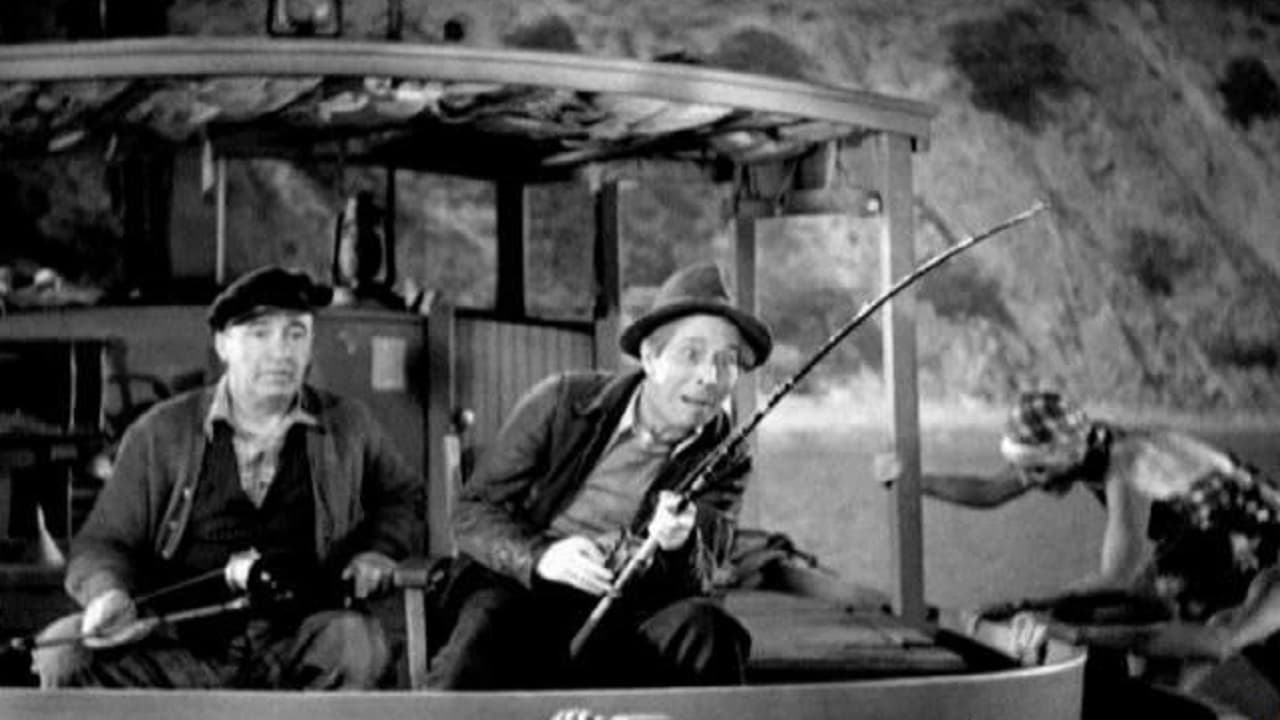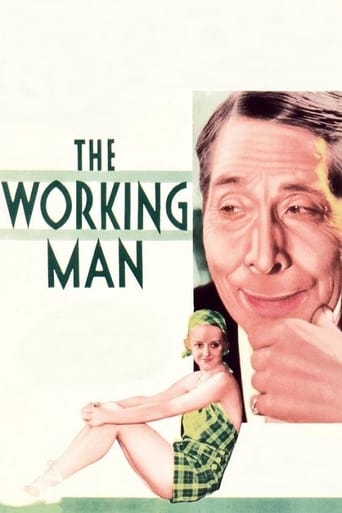Konterr
Brilliant and touching
Dorathen
Better Late Then Never
Bessie Smyth
Great story, amazing characters, superb action, enthralling cinematography. Yes, this is something I am glad I spent money on.
Brennan Camacho
Mostly, the movie is committed to the value of a good time.
bkoganbing
This was the second of two films that a young Bette Davis made with the great English actor George Arliss. In both films this one and The Man Who Played God, Arliss plays an older man who enjoys manipulating events and people for their own good as he sees it. In fact that other title is rather self explanatory.The Working Man casts Arliss as a wealthy shoe manufacturer who is taking a long needed vacation and he leaves his nephew Hardie Albright in charge of the company. While on that vacation he meets the children of a recently deceased rival who are nice kids, but are wastrels and spendthrifts without a thought as to how the money they spend is made. In fact dad's company is tobogganing into bankruptcy due to bad management.Bette Davis and Theodore Newton could have been his kids. The great manipulator gets him appointed the man who administers their trust and installs some discipline in both their lives. The end absolutely rights itself.Bette Davis was never known for praising her colleagues save for a few. But George Arliss was one of the few who saw some of the talent and the fire in that woman to succeed and said so loudly and publicly to the brothers Warner. She writes in her memoirs how ever grateful she was to him for the rest of her life.The fire in Davis burns rather brightly here because it contrasts with both Theodore Newton and Hardie Albright, a pair of young actors who give good performances, but really are rather bland next to Davis.And Arliss is always a delight in comedy or drama. You've got to love that foxy old guy. And love The Working Man as well.
JohnHowardReid
As Bette Davis herself often confirmed, in the "George Arliss Unit" as it was called, director Adolfi was simply a tool in the hands of producer, George Arliss. Whilst Adolfi had some control over camera set-ups, it was Arliss himself who directed all the actors. Not only that but Arliss also functioned as an executive producer. He was not answerable to either Warner or Zanuck. Arliss was answerable only to himself. He functioned independently and was actively engaged in selecting what he would produce, whom he would cast and all other work from preliminary through to final.So here's the team of George Arliss-John G. Adolfi back again. Mr. Adolfi lets Mr. Arliss have his head, which we don't mind because Mr. Arliss is a charismatic person who can carry a scene and make weak dialogue sound strong if nobody can. But unfortunately Mr. Adolfi also lets rotten players like J. Farrell MacDonald (and to a lesser extent Theodore Newton and Hardie Albright) chew up the scenery too. Bette Davis plays another youthful heiress in this one but Adolfi and Arliss obviously thought well of her ability because most of her scenes with the actor are filmed in long takes. Some reliable character actors like Gordon Westcott, Douglass Dumbrille and Edward Cooper (who plays a particularly opportunistic butler) are also present but it is Arliss's film and he makes the most of it, even though he does seem a trifle out of place in modern dress.
mmipyle
CONTAINS SPOILERS!!!Last night we watched our favorite George Arliss film, "The Working Man" (1933). This one not only has Arliss, but young Bette Davis (in her second film with Arliss, who more or less "discovered" her!), J. Farrell MacDonald, Hardie Albright, Theodore Newton, Gordon Westcott, and others.This one is about a rather dysfunctional late 20's/early 30's wealthy family where the father dies and his flapper age children let the business slide, besides putting a head manager in place who now runs the company poorly so that it will fail and be taken over by a buy-out plan in which he's secretly involved. The business is a shoe business, and it's in direct competition with George Arliss' shoe company. Arliss has now let his nephew into the head managing job in his own shoe business, and this nephew thinks that George Arliss is too old to run the company. Arliss "takes a vacation"; however, the "vacation" is really a ruse where Arliss goes to the competition, becomes a "guardian" of the children - legally - and teaches them how to run a business, besides - all this while never letting on who he is. The "vacation" becomes extended, of course. Meanwhile, Arliss "cleans up" his competitor's business by getting rid of the creep manager who's trying to undermine it, and in the end begins ruining his own business as a result. In the end, there's love - between Bette Davis and the nephew in Arliss' business, played by Hardie Albright - and a merger between the two companies. Believe me, this is a simplistic description of events. The truth is, the show is didactic. Most people today would simply balk at watching a didactic show. Frankly, I think it's the best comedy that George Arliss ever made. He was famous for his historical portrayals of famous men, but he also made a series of rather didactic comedies that are nearly unlike any other films ever made in English. I love them all. Actually, they probably portray the 1920's stage as well as any films ever made, a lost section of historical performance that makes itself come alive again in these Arliss vehicles.I not only highly recommend this, but for the viewer who wishes to see how Bette Davis became "discovered", this is the second of two (the other was "The Man Who Played God" (1932)) films she made where Arliss let her show her stuff, so to speak. These films have so much to offer to those willing to put themselves back into a period that is most unlike our own! Given that perspective, this will transport the viewer into another era and allow him/her to see a totally different kind of writing, acting, and format. There's just nothing out there today - at least in America - to compare to Arliss and his brand of film-making.A couple of years ago Warner Archive Collection put out a three film Arliss collection to let viewers re-acquaint themselves with Arliss who died in 1946, and who is nearly forgotten today, although he won one of the first Oscars for Best Actor in 1929 for "Disraeli". In the set were three Arliss comedies, "Old English" (1930), "A Successful Calamity" (1932), and "The King's Vacation", but none of his portrayals of historical figures. This was a curiosity in and of itself! It doesn't do justice to the man. However, the fact that "Old English" was included was a great choice! "The King's Vacation" has a very young Dick Powell in it, so it has some kind of "modern" appeal. "A Successful Calamity" has Mary Astor in it, so ditto what I just said. I'd love to see a second set out with "Disraeli", "The Man Who Played God", and "The Working Man" in it. These were very successful vehicles for Arliss in their time. A set with both the silent and the sound "The Green Goddess" (1922/1930) would also be fascinating. Arliss needs to be re-discovered!!
movingpicturegal
Interesting story of a sly old fox (George Arliss), owner of the Reeves Shoe Company, who seems like he'd rather be fishing with his pal in Maine than running the business, so heads off for a fishing holiday, leaving his conceited nephew in charge of biz. While out fishing, he accidentally meets up with the son and daughter of Hartland, his recently deceased one-time friend and biggest rival in the shoe business. Giving them a fake name, the two youths have no idea he is rival Reeves, but they are really more interested in contacting bootleggers, throwing drunken parties, and running through their inheritance anyway. After heading back home with these two to get an "inside look" at the workings of their shoe factory and make an offer to buy the company, Reeves sees that the company is being run into the ground and decides he would rather help these Hartlands out instead - see, he was once in love with their mother, not to mention his swollen-headed nephew thinks he's too old to run a business anymore - he'll show the young whippersnapper! So he gets the Hartland's to make him their new trustee/guardian (and they do it 'cause they think he is just a simple "old fisherman" who will give them all the money they want to run wild with), then takes a firm hold of the running of the company and the young Hartlands!Really good film with excellent script and performances all around. George Arliss is an old charmer, really endearing in this film - he makes you really want to root for him. Bette Davis looks real cute in this, and does a great job, as always, in her part. The story is lots of fun to watch, and left me with a smile at the end - credit for this film really belongs to George Arliss who dominates the film and makes it a good one.

